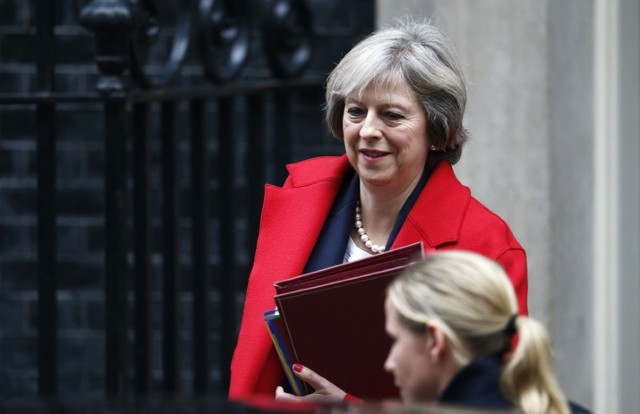Theresa May’s Brexit battle returns to British parliament


British lawmakers will begin debating landmark legislation on Thursday to end Britain’s membership of the European Union, with Prime Minister Theresa May gearing up for a major battle.
The bill would repeal the European Communities Act, which enshrines Britain’s membership of the bloc on the day it leaves the bloc and convert an estimated 12,000 existing European regulations into British law.
Ministers say it is the first step in implementing last year’s referendum vote for Brexit, and will provide legal continuity to ensure no “cliff-edge” when Britain leaves the bloc in March 2019.
POWER GRAB
But opposition parties say it also represents a “power grab” by giving the government the ability to amend the EU laws as they are transferred without proper scrutiny, and have vowed to fight it.
May’s Conservative party lost its majority in the House of Commons in a snap election in June, and will be relying on its alliance with Northern Ireland’s Democratic Unionist Party to get the bill through.
This battle is just the first of many in parliament, as ministers need to pass a string of bills to implement Brexit over the coming months in areas such as customs and immigration.
Meanwhile in Brussels, the first round of divorce negotiations with the EU is progressing slowly, threatening Britain’s hopes to move on to talks on a future trade relationship within weeks.
THE GREAT REPEAL BILL
Here are some key points of the “EU Withdrawal Bill”, formerly known as the “Great Repeal Bill”:
– The text of the draft law begins by saying that it is “A bill to repeal the European Communities Act 1972 and make other provision in connection with the withdrawal of the United Kingdom from the EU”. This would end the supremacy of EU law in Britain.
– The law would also convert an estimated 12,000 existing European rules into British law, covering every aspect of British life. The House of Commons library has called it “one of the largest legislative projects ever undertaken in the UK”.
– The bill includes special executive powers for ministers to amend laws being transferred to take account of the changed circumstances of Brexit, commonly referred to as “Henry VIII powers”.
Officials estimate that between 800 and 1,000 of these delegated powers, which cannot be used to raise taxes or amend human rights laws, will be needed.
The power would expire two years after Brexit.
– The bill provides for all the powers currently held by Brussels to be transferred back to the Westminster parliament, even where they involve policy areas that have been devolved to Scotland, Wales and Northern Ireland.
The government has then promised discussion on devolving these powers but the semi-autonomous administrations are sceptical they will really do so and have threatened to hamper the bill’s passage.
POWER-GRAB
May has said the bill is “the single most important step we can take to prevent a cliff-edge for people and businesses, because it transfers laws and provides legal continuity”.
Officials say they need the special executive powers to address any “deficiencies” in the EU laws being transferred, and say those powers will be limited to two years.
But the main opposition Labour party condemned the bill as a “power-grab” and said it would seek to defeat it when, after two days of debate, the House of Commons holds its first vote on it on Monday.
“Nobody voted in last year’s referendum to give this Conservative government sweeping powers to change laws by the back door,” said a spokesman for the party.
The third largest party in parliament, the Scottish National Party (SNP), has also vowed to vote against the bill on Monday, while the smaller pro-European Liberal Democrats are also likely to follow suit.
REBEL TORIES?
After May’s humiliating election setback in June, where she called a snap election only to lose her party’s majority, the prime minister was forced to agree a deal with Northern Ireland’s ultra-conservative Democratic Unionist Party (DUP).
With their support, the government has a working majority of 13 MPs and the first stage of the Repeal Bill should pass.
But May is vulnerable to rebellions by her own MPs as the bill progresses in the coming weeks.
AFP